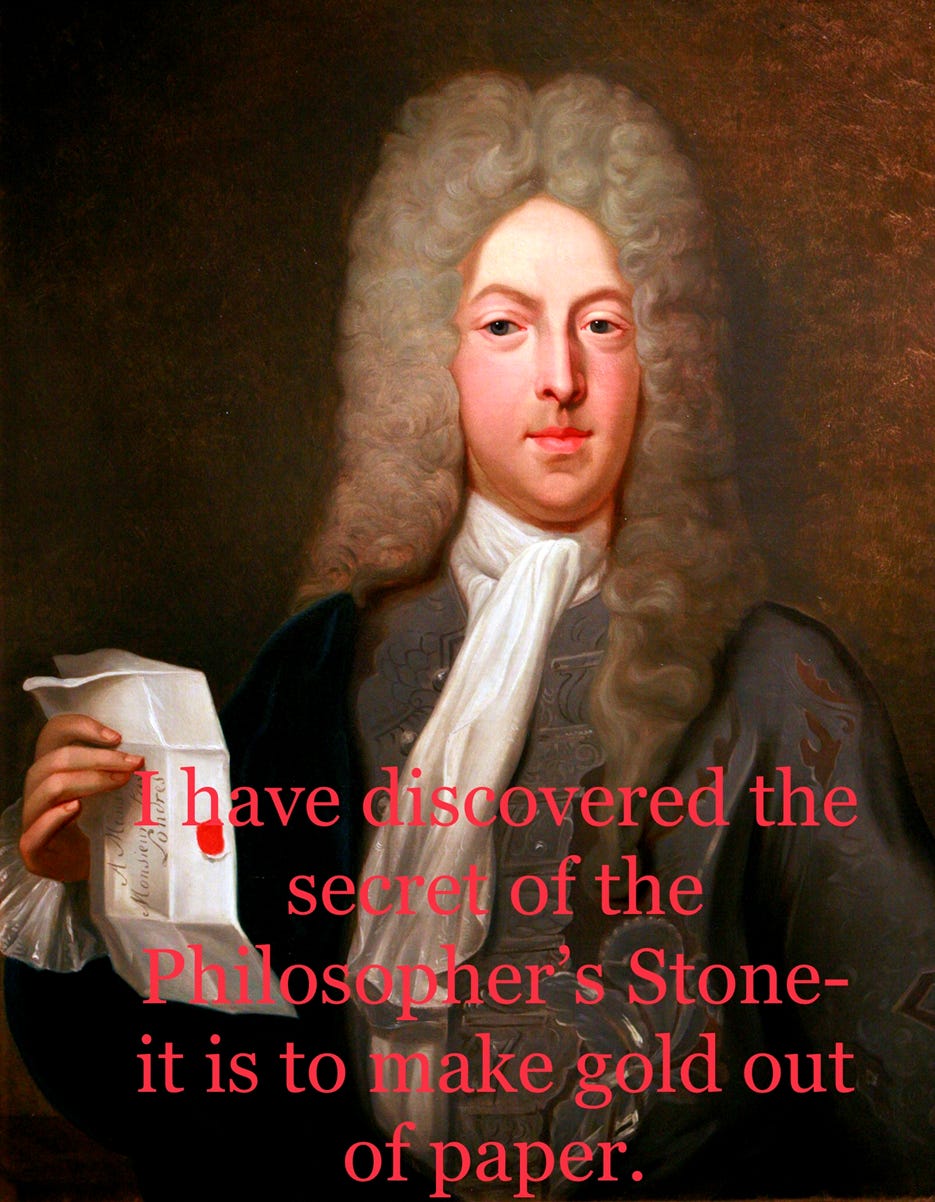Managerial Momarchy
Managerial Momarchy
or, The God of Clownworld
For those of you who don’t know, in my daily life I am a schoolteacher. I work at a private high school; my students are all males and mostly seniors. My responsibilities for the last couple of years have been teaching government and economics classes. I tend to approach these subjects the same way I do history, through narrative and illustration rather than quantitative analysis, exploring themes and ideas by way of real-world examples. In economics the central overarching narrative of the class is the 2008 Banking Crisis and the subsequent Great Recession. I introduce the ideas of pride and overreach; the men involved are often thought of as greedy, but as I point out, they have all the money they could ever want already. Greedy men only want more things. The titans of finance want more things than others, particularly their fellow banksters. I explain that much of finance is simply magic, the manipulation of abstractions from which wealth is conjured from nothing à la Rumplestiltskin. But like the Sorcerer’s Apprentice, the masters of the financial universe don’t really understand the forces they manipulate, and in their petty short-sightedness cause disasters.
John Law, the Scottish gambler and convicted murderer who escaped an English dungeon, fled to France, made friends with the Duc D’Orleans in a casino, got put in charge of the entire French economy, started a national bank, founded New Orleans, created a massive stock bubble that cratered the French economy, and had to flee France for his life, whereupon he resumed professional gambling abroad. The term ‘millionaire’ was invented to describe those who initially benefited from his plans.
In my government class the central story arc is the 2016 election of Donald Trump, and the subsequent political fallout. I explain to the class the concept of legitimacy and the nature of a managerial regime. The basis for that system’s legitimacy is organizational competence; their mandate from heaven is bestowed for their ability to scientifically understand large systems and maintain high levels of material prosperity and social cohesion. Trump was just the latest in a series of disasters that exposed their failure at exercising those functions- isolated in cognitive bubbles with scores of other fungible, box-checking mediocrities, they have simply lost touch with those whom their power depends upon their understanding. Their legitimacy is thus called into doubt, and the question arises- what does a system do when its existence is on the line?
And thus we approach the main theme of the class: freedom. What does it mean to be free, and how would you know if you were not free? What does a system do when a conflict arises between freedom and the standing of the regime? We explore these concepts in the abstract- classical vs liberal notions, that sort of thing- but we also go to the very edges of where those questions manifest. We talk a lot about criminals.
A criminal proper is someone who violates a positive, or man-made law. One who violates a Divine law is a sinner. Sometimes the overlap in a society between sin and lawbreaking is close- this is increasingly true in Western societies, where “hate” is taken more seriously than actual crimes. Notice that one’s legal system need not recognize the existence of the Christian God for there to be a will to punish sin; the gods of progress- the rulers of the darkness of this world- will suffice, and sins against them are in any case crimes against the regimes that worship them. There will never be a regime that does not punish sins because every stable regime requires some mandate beyond the fact of its own existence to legitimize it, and thus, in some sense, fundamental challenges to that sense of cosmic order that undergirds a regime necessitates something more severe than punishment- damnation.
A healthy regime cares for both the moral and physical well being of its citizenry. Achieving the former leads to an increase in the latter, which then results in a slackening of the moral order and its replacement with a counter-morality based on selfish hedonism and exploitation, whereupon the physical security of the people is abandoned in favor of increasingly symbolic and abstracted attempts to enforce the counter-morality. It is a world where murder and robbery are secondary problems to racism, where “generational trauma” and “white privilege” work like evil spirits to induce harm on passive victims. If you replaced the term “systemic racism” with “witchcraft” you would lose no meaning.
If you think she’s only talking like this because she’s drunk, keep in mind that [EDIT- at least some of] the people who taught her all those buzzwords were stone cold sober.
Our modern Western system does still retain vestiges of the past moral order, ruins that stand like stone guests in our midst. Most crimes are still treated like crimes in most places, and the public expectation, at least in much of the US, is that people who break laws belong in prison. The world coming into being is in tension with the older ways; adhering to the latter puts one at odds with the former, and vice versa. One who breaks the laws of the world to serve a higher law is a saint, and probably a martyr; one who breaks God’s law in favor of a contrary law of man is monster, worthy of damnation. But which god and which men? The complexities of all this serve for interesting starting points for discussions of philosophical issues.
One of the documentaries we watch is Solitary: Inside Red Onion. Produced by HBO, the film explores the lives of men locked away in a supermax prison in Virginia. They aren’t there for what they did on the outside- that’s what regular prison is for- but because they broke the rules within. They embarrassed the system, showed it to be either weak or inadequate, and thus ended up in a place where they are locked in bathroom-sized cells twenty-three hours a day, lights always on. Getting moved anywhere means someone searching your rectum and being held the whole trip, shackled hand and foot. Those who still insist on violating rules will be strapped down to their beds in five-point restraints. They howl, they bang, they bite chunks out of their own arms . . .
I point out to the students that a system can stand normal crime. If anything, normal crime stands to validate the system by reinforcing the need for it. What a system cannot stand is humiliation. They always ask me why the system doesn’t just execute these people. I always answer the same way. The men in regular prison are there to be punished. Those in supermax are there to suffer, and suffer conspicuously, as a warning to others that they might threaten but never mock. Dead men can’t be seen to suffer. Check out the federal supermax prison some time, ADX Florence in Colorado. It’s a rogues gallery of profoundly evil men (and some who were just violent idiots) who were buried alive in our national oubliette for making the gagillion dollar surveillance state look dumb.
Our attitude toward such people and the system is one of Freudian ambiguity. We revel in their transgressions, but ultimately long for the social order to reassert itself. It’s a decadent people who gain vicarious pleasure from the acts of criminals, but so too do a people hungry for justice against a system that wrongs them, that feels illegitimate. It’s the basis for the appeal of El Chapo; it’s the basis of the appeal of Donald Trump. Everyone understands that the propagandistic mantra chanted by the regime media, “no one is above the law,” is a cruel joke. Some, like our managerial caste, are very much above it; others, like those now living in communities enriched by diversity, are quite beneath it. At the heart of the chant of “drain the swamp” is the desire for a reckoning, for things to be set right, but also a longing for a cathartic purging of systemic evil, the removal of some toxic and transgressive element at the center of the dysfunction most people intuit. It’s why the trans issue figures so powerfully alongside crime and inflation and immigration; all of them tie together as symptoms of one thing- humiliation.
Pictured above: the men the regime wants you to salute. Figure A. 1945; Figure B. 2024
The ambiguities work both ways. The system fears humiliation above all, and paradoxically thus visits it on its enemies at every opportunity. The point of dragging Trump through hopeless but costly show trials is to embarrass him as he has in turn embarrassed them. That this only further reveals the managers’ own clownish inability to manage just further ratchets up the stakes.
Pictured above: the ratchet.
This is true of Ukraine, where the only point of the current round of propaganda blaming Republicans in congress for Ukraine’s alway-inevitable defeat is to hysterically mock the patriotism of those regular people another line of abuse is currently driving out of military service. It’s true of immigration; foreigners are allowed to mock the laws and culture and safety of Americans, especially those people tempted to think they can do without the regime’s protections. They imprisoned you in your homes and made you wear the mask of submission; to regain your former life you had to take their medicine. They spent all of 2020 allowing regime mobs to torch your cities as punishment for America having humiliated them in the previous election and mocked the whole legal system with last-minute rule changes that allowed them to regain power. And the man they installed every day demonstrates the contempt the regime has for the people it lords over, a senile grifter whose age exists to remind Americans both of a society that once worked and the current reality where everything is broken.
And this is the dark shape that I hint to them is coming into being. The counter-morality is one of hierarchy based on the spectacle of inflicted disgrace. The regime, divorced from any claims to transcendent values, and cringing, at least for now, from open violence, has only the bureaucrat’s slow-walking, buck-passing, indolent passive-aggressive selective rule-thumping to visit upon its subjects. The petty tyranny of the distant and unseen authority that sometimes coalesces at a certain pressure point to ensure that what liberties are enjoyed by their enemies are systematically wrung out of them, and in a way that strips not only resources, but most importantly, dignity. The only crime is noticing, the only punishment is humiliation.
The thing to do above all is to remember that such is the weapon not of the strong but of the weak. Humiliation is the damnation of children, the worldly, and the soon-to-pass. No healthy regime needs to abuse its citizens. Momos, the Greek god of mockery, was a friend of the people fighting abuses; he had been expelled from Olympus. No god could abide his company, and any regime that makes use of such against those it rules is unstable, despite any appearances. My hope is that my students embrace their own dignity, and understand that ultimately the slanders directed and those who see are the parlor tricks of those who would have you not know. Freedom, pace the vain imaginings of liberalism, is not the absence of restraint but the embrace of discipline, and while that will be reinforced in a healthy society it can ultimately come only from within, from a connection to the higher things, to truth. And once known, the truth abides, and is a sure hope against the low and transitory.
Source: The Library of Celaeno




Comments
Post a Comment